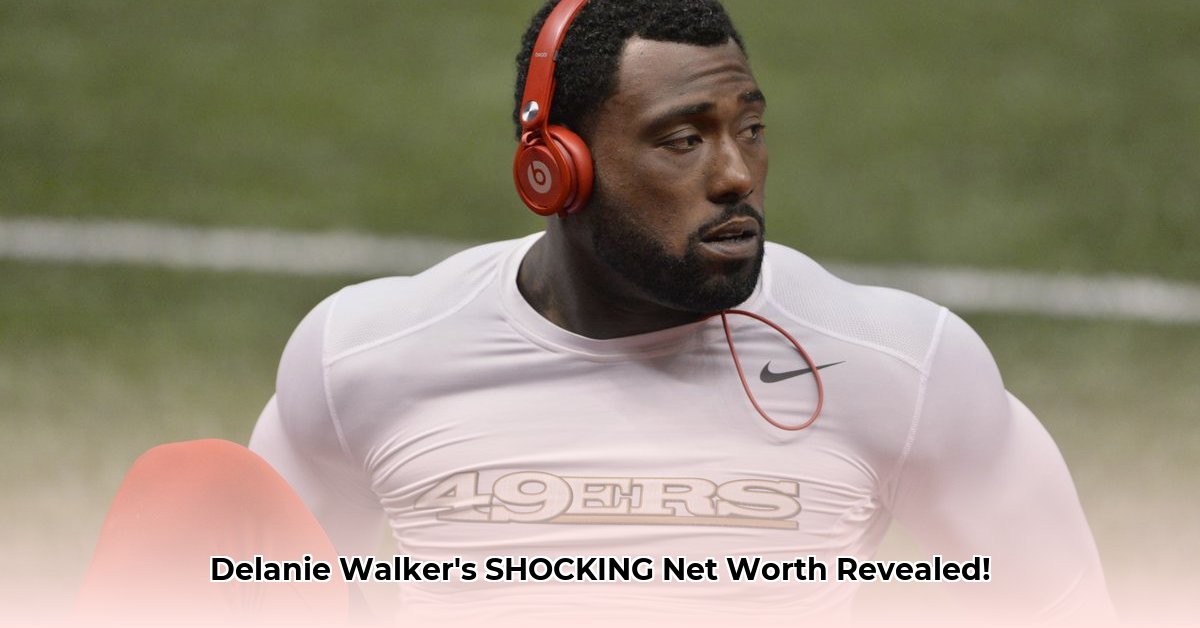
Delanie Walker's net worth reflects a complex interplay of on-field performance, contract negotiations, and the unfortunate reality of injuries in professional football. This analysis delves into his financial journey, examining how his earnings evolved and how unforeseen circumstances impacted his overall wealth.
From Humble Beginnings to NFL Stardom: A Steady Rise in Earnings
Delanie Walker's NFL career began with a standard rookie contract, offering a significant financial step but not immediate riches. However, his exceptional versatility—a reliable receiver and blocker, excelling even on special teams—quickly elevated his value. Subsequent contracts reflected his growing importance to the Tennessee Titans, demonstrating a clear correlation between performance and compensation. His earnings steadily climbed, reflecting his transition from a promising player to a key offensive contributor. How much did his initial contract pay him compared to his peak earnings? The difference highlights the financial rewards of sustained success in the NFL.
The Unforeseen Impact of Injuries: A Cautionary Tale
Recurring ankle injuries significantly altered the trajectory of Walker's career and, consequently, his earning potential. The 2019 season, heavily impacted by injury, serves as a stark example. Missing significant game time directly reduced his earning capacity. His eventual release from the Titans, while understandable given his health concerns, underscores the harsh realities faced by injured players. What if he had remained consistently healthy? The hypothetical impact on his career earnings is substantial, highlighting the inherent financial risk of a professional athlete's career.
Decoding the Contract Structure: Guaranteed Money and Risk Mitigation
Analysis of Walker's contracts reveals a strategic approach to managing career risk. Substantial guaranteed money, a significant portion of his overall compensation, provided financial security even amidst injury setbacks. These guarantees, likely totaling tens of millions over his career, represented a key element in protecting his earnings. This strategy, now more common among players and their agents, illustrates a move toward better financial protection against the inherent uncertainties of NFL careers.
A Simplified Look at Walker's Earnings Trajectory
Precise annual figures for every contract are often unavailable, but a general trend emerges. His average annual salary increased significantly over his career, reflecting his increased value and enhanced role within the team.
| Contract Phase | Approximate Annual Salary Range (USD) | Significant Guarantees (USD) |
|---|---|---|
| Rookie Contract | $400,000 - $500,000 | Low |
| Early-Career Extensions | $1,000,000 - $3,000,000 | Increasing |
| Peak-Performance Contract | $7,000,000 - $9,000,000 | High (Multi-million) |
(Note: These figures are simplified estimations based on available information and may not represent precise values.)
Lessons from Walker's Financial Journey: Implications for Stakeholders
Delanie Walker's experience offers valuable insights for various parties within the NFL ecosystem. For teams, it emphasizes comprehensive injury risk assessment during contract negotiations. For players, it highlights the importance of injury prevention and negotiating contracts with robust injury protections. For agents, it underscores the necessity of prioritizing long-term financial security for their clients.
How can a player best protect themselves against career-ending injuries? The answer, exemplified by Walker's experience, involves a careful balance of risk assessment and strategic contract negotiations.
Calculating NFL Contract Value: Incorporating Injury Risk
Evaluating an NFL player's contract value requires a nuanced approach that moves beyond simple salary figures. It's a complex financial equation that necessitates considering several factors.
Key Contract Components
NFL contracts involve various components:
- Guaranteed Money: Payment regardless of performance or injury.
- Base Salary: The annual salary, often variable.
- Signing Bonus: A lump sum at contract signing.
- Roster Bonuses: Payments for making the active roster.
- Incentive Clauses: Performance-based bonuses, subject to player health and on-field success.
These elements significantly impact how contract value is determined.
The Critical Role of Injury Risk
Injuries drastically affect a player's value. A high-value player sidelined by injury may not fully justify their contract. Therefore, incorporating injury risk into contract valuation is crucial. This incorporates:
- Injury History: Past injuries, their severity, and recovery time are key predictors.
- Positional Value: The impact of a quarterback's injury is far greater than a backup linebacker's.
- Contract Structure: Guaranteed money plays a significant role in risk allocation between the player and the team.
- Projected Future Performance: Injury risk directly affects this projection, ultimately impacting value.
A Holistic Valuation Approach
Accurate contract valuation demands a holistic method incorporating the above factors. Teams often utilize sophisticated statistical models and expert medical opinions to estimate injury probabilities. This forms the basis of risk assessment during contract negotiations.
Using Delanie Walker’s case as a study, we can see the impact of injury. His career demonstrates that, whilst his early contracts were lucrative, subsequent injuries significantly impacted his ability to command high salaries. His case serves as a stark warning for the importance of incorporating injury risk into any contract valuation.